A great teacher does more than deliver lessons – you inspire, guide, and somehow manage to keep a classroom engaged (even on a Friday afternoon). Whether you specialise in primary, secondary, or special education, your CV needs to demonstrate that you can balance curriculum demands with creativity, classroom management, and student support.
This guide, along with 7 Teacher CV examples will help you craft a teacher CV that highlights your expertise, showcases your impact, and ensures hiring managers see you as the kind of educator every school wants.
Primary School Teacher CV example
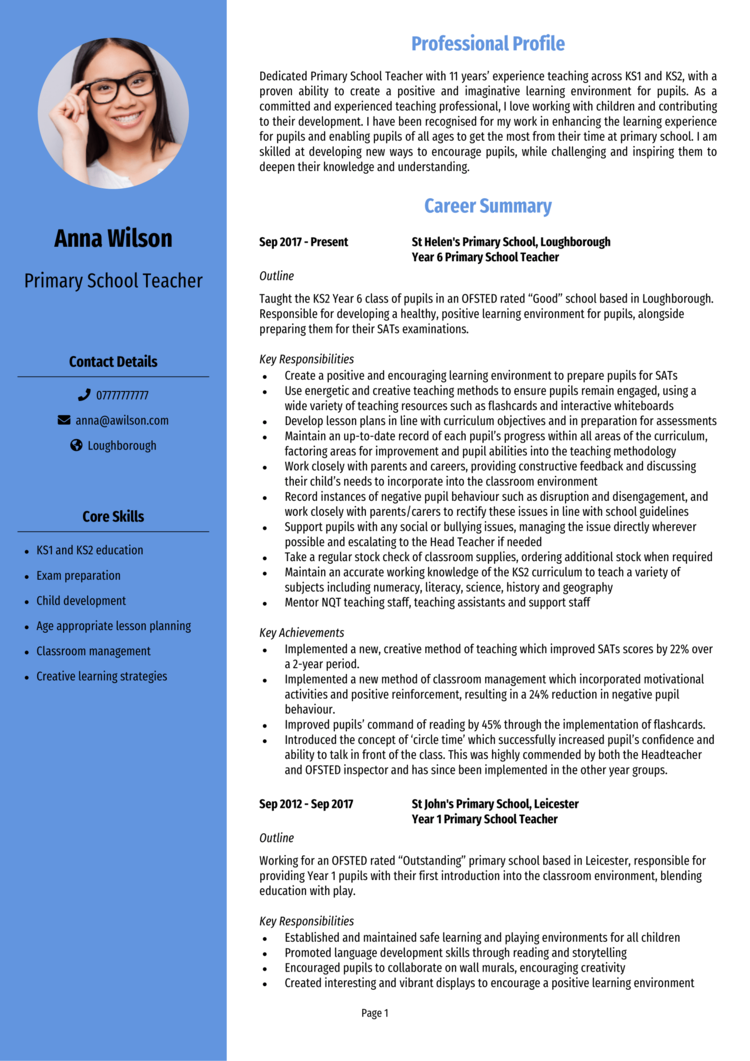
Secondary School Teacher CV example

Business Teacher CV example
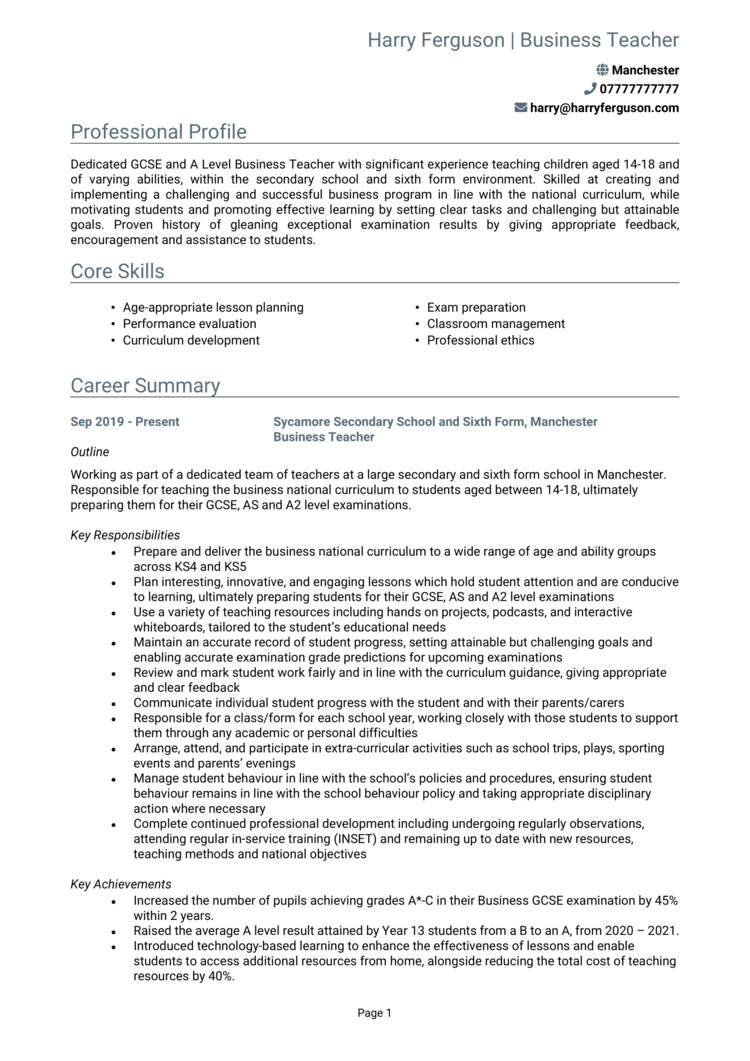
NQT (Newly-Qualified Teacher) CV

History Teacher CV example
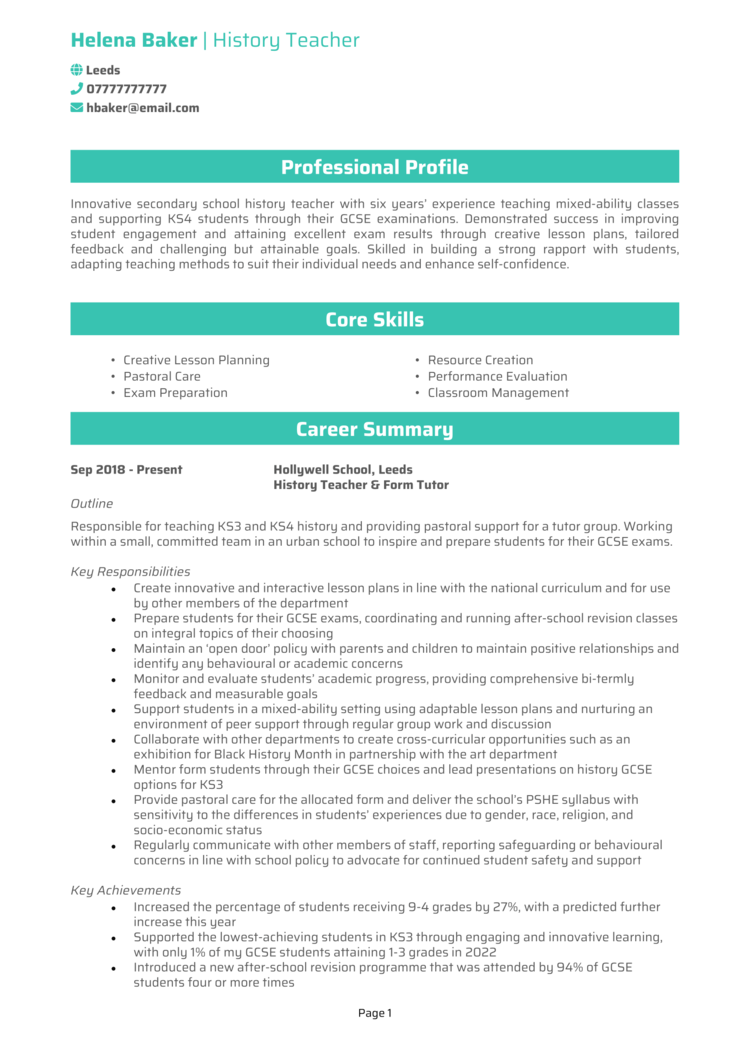
Maths Teacher CV example
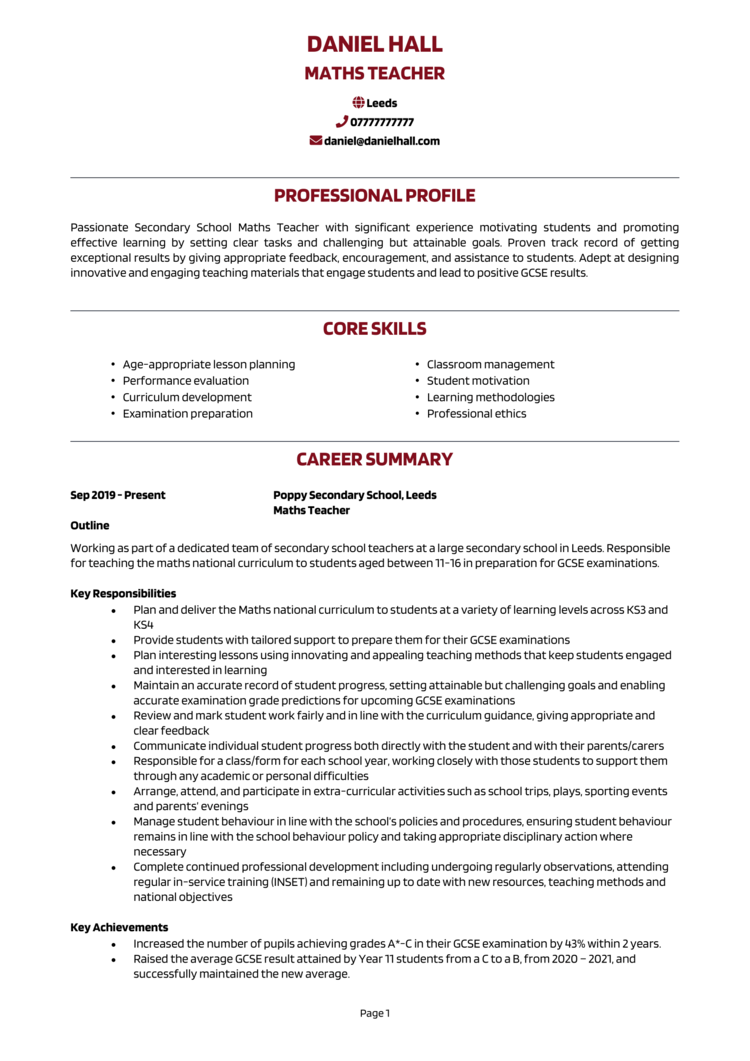
Head of Department CV example
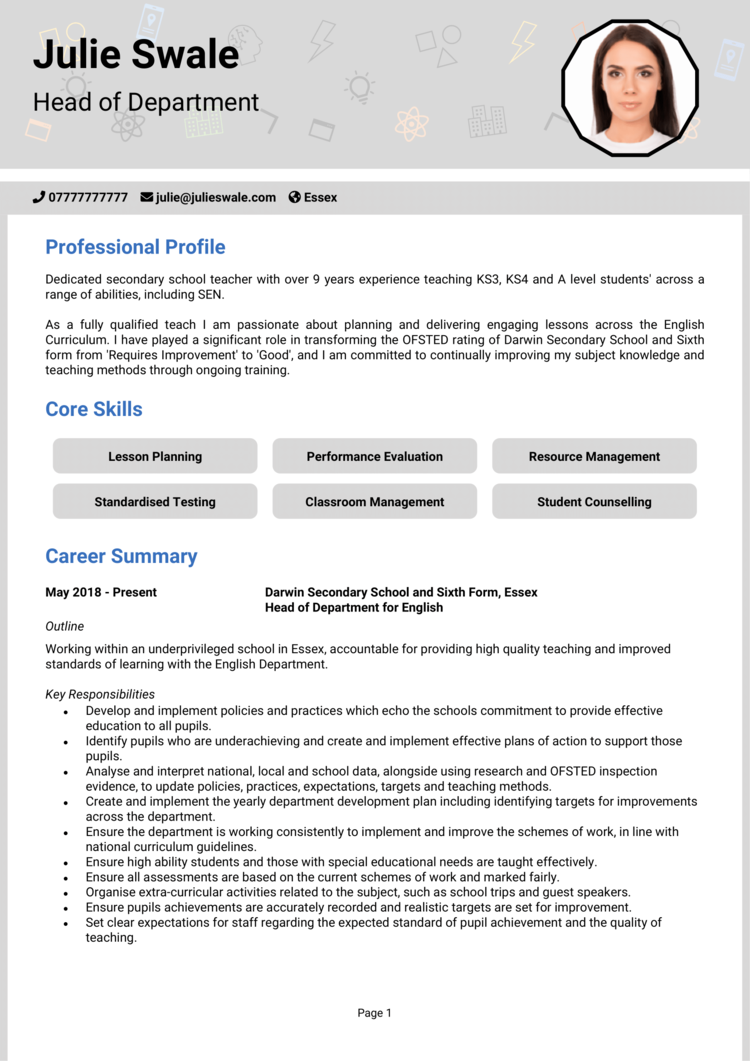
How to write your Teacher CV
Learn how to create your own interview-winning Teacher CV with this simple step-by-step guide.
A flawless lesson keeps students focused and engaged – your CV should do the same for hiring managers. Whether you’re starting as a teaching assistant or applying for the head of department, if your CV is hard to navigate, schools won’t waste time piecing it together.
To make sure your CV passes the recruitment test with top marks, we’ll break down how to format it, structure your experience, and showcase your strengths as an educator. By the end, you’ll have an academic application that stands out.
How to structure your Teacher CV


A teacher’s CV should be easy to read, with each section providing a clear snapshot of your experience and skills. Schools want to see at a glance that you meet their requirements, so keep it logical and well-organised when you’re writing your CV.
Here’s the structure to follow:
- Name and contact details – Keep these personal details at the top so schools can reach you quickly alongside a totally optional photo of yourself.
- Profile – A strong summary that highlights your teaching philosophy, experience, and key strengths.
- Core skills – Provide a snapshot of your most relevant abilities, from curriculum planning to behaviour management.
- Work experience – List your teaching roles in reverse chronological order, focusing on responsibilities and achievements.
- Education – Detail your teaching qualifications and any degrees, starting with the most recent.
- Additional info – Optionally include relevant hobbies and interests and awards that might help convey your expertise and passion.
Teacher CV format


A well-organised, professional layout ensures hiring managers can quickly find what they need. Your CV format should be as neatly presented as a well-prepared lesson plan – if it’s chaotic, messy, or longer than a school assembly speech, it’s time to tidy it up.
Follow these formatting tips:
- Bullet points – Use short, sharp bullet points to present your responsibilities and achievements clearly.
- Divide sections – Make use of distinct headings and logical spacing to guide recruiters through your CV.
- Use a clear and readable font – A simple, professional font ensures readability while keeping the layout polished and tidy.
- No more than 2 pages – This gives you enough length to detail your experience while keeping it concise enough to respect the recruiter’s time.
The best way to write a Teacher CV profile


Your CV profile is your chance to introduce yourself as an educator. It should be a short but impactful summary that conveys your teaching approach, experience, and the value you’ll bring to any school.
Teacher CV profile examples
Profile 1
Dedicated Teacher with five years of experience delivering engaging lessons and fostering a positive learning environment. Skilled in curriculum development, classroom management, and differentiated instruction to support diverse learning needs. Experienced in using digital tools such as Google Classroom and interactive whiteboards to enhance student engagement. Passionate about inspiring students and promoting academic success.
Profile 2
Enthusiastic Teacher with three years of experience in primary and secondary education, specialising in literacy and numeracy. Adept at developing creative lesson plans, assessing student progress, and using student-centered teaching methods to improve learning outcomes. Committed to creating an inclusive and supportive classroom where students feel motivated to achieve their potential.
Profile 3
Experienced Teacher with over seven years of expertise in secondary education, focusing on science and STEM subjects. Skilled in integrating hands-on experiments, technology, and inquiry-based learning into lessons. Proficient in using assessment tools to track student progress and adapt instruction accordingly. Passionate about helping students develop problem-solving skills and a lifelong love for learning.
What to include in your Teacher CV profile
Your profile should include:
- Your teaching experience – Specify the age groups or subjects you teach.
- Your teaching philosophy – Whether you focus on student engagement, inclusive learning, or innovative teaching methods, highlight it here.
- Curriculum expertise – Schools need to know that you can confidently deliver lessons in line with educational standards.
- Classroom management skills – Effective behaviour management is key to a thriving classroom.
- Additional contributions – If you’ve led extracurricular activities, mentored new teachers, or developed new initiatives, mention it.
Core skills section


A core CV skills section helps hiring managers quickly assess your key strengths. It’s a simple one or two columns of bullet points that list off the primary hard, tangible skills that recruiters scan for. Teaching roles vary widely, so tailor this section to match the job description and the school’s specific needs.
Best skills for your Teacher CV
- Curriculum Development – Designing engaging and structured lesson plans aligned with educational standards.
- Classroom Management – Implementing strategies to maintain a productive and respectful learning environment.
- Differentiated Instruction – Adapting teaching methods to accommodate diverse learning styles and abilities.
- Subject Matter Expertise – Delivering in-depth knowledge in specific subjects, ensuring clarity and accuracy in instruction.
- Assessment and Evaluation – Designing tests, assignments, and informal assessments to track student progress and learning outcomes.
- Lesson Delivery – Presenting information in an engaging, clear, and interactive manner to enhance student understanding.
- Student Engagement Strategies – Using storytelling, discussions, and hands-on activities to foster interest and participation.
- Parental Communication – Keeping parents informed about student progress and collaborating on learning strategies.
- Educational Technology Integration – Using digital tools like interactive whiteboards, online learning platforms, and educational apps to enhance instruction.
- Safeguarding and Child Protection – Ensuring student safety and well-being by adhering to school policies and safeguarding regulations.
Work experience


Your work experience should showcase more than just job titles – it should highlight how you’ve made a difference in your students’ learning. Schools want to see evidence of impact, whether that’s through student progress, innovative lesson delivery, or contributions to the school community.
List your teaching experience in reverse chronological order, focusing on how you’ve engaged students, supported their learning, and contributed to the wider school environment.
How to structure jobs

- Outline – Introduce the school, year groups or subjects taught, and any key responsibilities.
- Responsibilities – Describe your core duties, from lesson planning to student assessment. Use action words like “delivered”, “developed”, and “implemented”.
- Achievements – Showcase measurable impact, such as student progress, successful Ofsted inspections, or the introduction of new learning strategies.
Example jobs for Teacher
Primary School Teacher | Oakwood School
Outline
Planned and delivered engaging lessons for Key Stage 1 students, ensuring a well-rounded education in core subjects.
Responsibilities
- Designed and implemented creative lesson plans in English, maths, and science, aligned with the national curriculum.
- Used interactive teaching methods to enhance student engagement and understanding.
- Assessed student progress through formative and summative assessments, providing tailored support where needed.
- Established a positive classroom environment that encouraged participation and confidence in learning.
- Worked closely with parents and support staff to address individual student needs.
Achievements
- Improved class literacy levels by 20 percent through targeted reading interventions.
- Implemented an interactive learning programme that increased student engagement.
- Recognised by leadership for innovative teaching methods and student achievement.
Secondary School Teacher | Greenfield Secondary School
Outline
Taught Key Stage 3 and 4 students, delivering engaging and challenging lessons to support academic success and personal development.
Responsibilities
- Developed and delivered curriculum-based lessons in science, preparing students for GCSE exams.
- Incorporated technology and interactive resources to enhance classroom engagement.
- Differentiated instruction to cater to students with diverse learning abilities.
- Managed classroom behaviour effectively, promoting a positive and inclusive learning environment.
- Organised extracurricular activities, including science fairs and after-school clubs.
Achievements
- Increased student pass rates by 25 percent through structured revision sessions.
- Led a STEM club that boosted student interest in science and engineering careers.
- Recognised by senior leadership for outstanding teaching and student progress.
Subject Teacher | Sunshine Academy
Outline
Delivered high-quality English lessons to secondary students, focusing on literacy, creative writing, and critical thinking skills.
Responsibilities
- Planned and executed engaging lessons in literature, language, and creative writing.
- Provided detailed feedback on student work to help improve writing and analytical skills.
- Developed differentiated resources to support students of varying abilities.
- Led reading initiatives to encourage a love for literature among students.
- Collaborated with colleagues to develop cross-curricular projects.
Achievements
- Increased student engagement in literature by implementing interactive reading strategies.
- Improved writing proficiency by 30 percent through targeted writing workshops.
- Received excellent student and parent feedback for engaging and inspiring teaching methods.
How to list your educational history


Your qualifications are essential in a teaching CV. Schools need to know that you’re fully trained and certified to teach in your field, so list your education clearly.
If you’ve completed additional training in areas like SEN, safeguarding, or leadership, include those as well. List qualifications in reverse chronological order, starting with the most recent.
Key qualifications for Teachers
- PGCE (Postgraduate Certificate in Education) – A standard route into teaching for graduates.
- Bachelor of Education (BEd) – A degree specialising in teaching, often including QTS.
- Qualified Teacher Status (QTS) – Essential for teaching in most UK schools.
- NPQ (National Professional Qualification for Leadership) – Useful for teachers progressing into leadership roles.
- SENCO or Special Educational Needs Training – A strong addition if you work with students requiring additional support.





